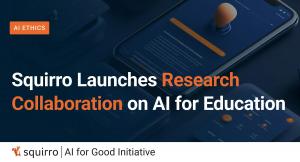Squirro, Universidad del Norte (Colombia), and Liverpool Hope University (UK) have partnered to tackle challenges in education brought about by the rise of AI.
ZURICH, SWITZERLAND, October 24, 2024 /EINPresswire.com/ — Squirro is proud to announce a new research collaboration with Universidad del Norte (Colombia) and Liverpool Hope University (UK) as part of an initiative focused on AI for Good. This partnership aims to tackle some of the most pressing challenges in education today, which is increasingly impacted by the rise of artificial intelligence. Key areas of focus include knowledge management, ethics and biases, and the digital divide, with a particular emphasis on the Global South.
The first public event of this collaboration was a webinar exploring the role of artificial intelligence (AI) in education, specifically how generative AI can help create ethical educational materials, enhance personalized learning, and promote inclusivity. The webinar addressed the ethical issues surrounding AI, such as AI bias, the excitement and concerns educators may have when integrating AI into the classroom, and the widening digital divide, especially due to disparities in resource availability across different regions. Experts from both academia and industry shared their insights, including Dr. Karen Villalba and Dr. Heydy Selene Robles Noriega from Universidad del Norte, and Dr. Lee Mackenzie from Liverpool Hope University.
“For me, AI has enormous potential for transforming our lives. As an educational researcher and practitioner, I am particularly interested in the factors which shape the extent to which AI is adopted and used in education. We seem to be living in a period of AI-hype with the assumption being that AI will transform industries, including education, for the better. However, a more balanced view of the potential of AI, which resists the tendency to ‘believe the hype’, will help ensure its judicious and appropriate use,” emphasizes Dr. Mackenzie from Liverpool Hope University.
While AI holds tremendous potential across various sectors, including education, a more deliberate approach—rooted in open discussions with academics, as Dr. Mackenzie suggests—would not only benefit education but also ensure that AI solutions across industries are implemented thoughtfully. This would emphasize long-term impact and ethical considerations rather than simply following short-term trends. This approach aligns with the growing call for responsible AI deployment, which is also being strongly advocated for within the European community.
Dr. Villalba similarly believes that “AI has the potential to positively transform education by fostering innovation, critical thinking, and creativity. For this reason, collaborating with industry beyond academia is valuable, as it bridges the gap between theoretical research and real-world challenges. In my specific field, I look forward to AI contributing to deeper insights in teacher and content development.” Indeed, AI is transforming education by personalizing learning experiences and streamlining administrative tasks. Adaptive learning frameworks can analyze student performance and tailor content accordingly, while intelligent tutoring systems provide real-time support both inside and outside the classroom. For educators, AI can automate grading and record management, allowing them to focus more on teaching. Additionally, AI enhances accessibility with features like real-time captioning and text-to-speech, and helps create smart content.
Aware of these and many possibilities, Prof. Dr. Robles Noriega highlights how “AI is revolutionizing teaching and learning across all disciplines. It is essential to understand the full potential of AI to provide effective teaching that meets students’ needs. AI connects classroom knowledge with real-world applications, preparing students for industry demands by incorporating the tools they will use in their careers”. As key academic figure at Universidad del Norte, Robles Noriega “hopes that AI will enhance the ability to deliver personalized learning experiences. In my field of research, which focuses on language learning and self-regulation, I envision AI tools offering tailored feedback and adaptive learning pathways.”
This collaboration between Squirro, Universidad del Norte, and Liverpool Hope University brings together diverse perspectives from different regions and disciplines, creating a dynamic platform to explore the intersection of AI, education, and social impact. It is especially valuable in promoting equitable access to technological power. Squirro, from a technological standpoint, believes it holds a unique advantage by emphasizing flexibility and being LLM-agnostic when selecting large language models (LLMs) and generative models. This approach spans both private and open-source options, allowing Squirro to influence the databases that serve as the foundation for educational content and shape relationships with key players in the innovation space, where monopolistic tendencies can sometimes emerge.
Such nuances have already been explored in earlier stages of this initiative. Dr. Mackenzie notes, “Academia is an industry, albeit a unique one. Collaborating with other disciplines—or industries—can yield valuable insights that might otherwise remain hidden. One example is ‘vendor lock-in,’ which I only learned about through my discussions with Squirro.” Education and open discussions, both for academics and industry professionals, can help academia overcome concerns, address critical issues, and enable industry to develop sustainable and respectful solutions.
About Squirro
Squirro is a global SaaS provider headquartered in Zürich, Switzerland, offering enterprise-ready generative AI, search, business insights and automation solutions. Their mission is to empower organizations with the precision-engineering they need to harness the full potential of their data through advanced AI technologies in an increasingly competitive global marketplace.
About Universidad del Norte
Universidad del Norte, based in Barranquilla, Colombia, is a prominent academic institution known for its focus on fostering innovation and research in education, technology, and social impact.
About Liverpool Hope University
Liverpool Hope University is an esteemed UK-based university, renowned for its forward-thinking research and multidisciplinary collaborations that bridge the gap between academia and industry.
Simone Abbiati
Squirro
simone.abbiati@squirro.com
Visit us on social media:
X
LinkedIn
YouTube
Legal Disclaimer:
EIN Presswire provides this news content “as is” without warranty of any kind. We do not accept any responsibility or liability
for the accuracy, content, images, videos, licenses, completeness, legality, or reliability of the information contained in this
article. If you have any complaints or copyright issues related to this article, kindly contact the author above.
![]()






